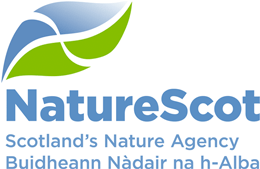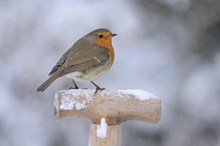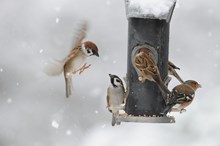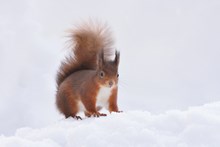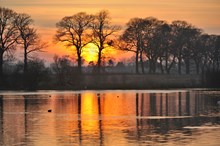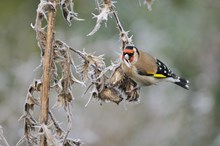06 January, 2023
New year for nature: six ways to help wildlife in 2023
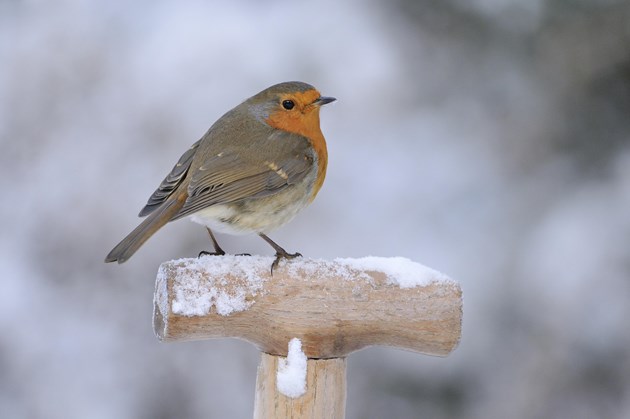
More than half of Scots indicated they wanted to take action to help nature in 2022. These intentions now appear to be making a difference.
NatureScot’s research into people’s relationship with the outdoors during the pandemic found 52% wanted to do more to help local wildlife. Now, the latest figures from NatureScot reveal typical garden birds such as blue tits, great tits and goldfinches have seen rises in their numbers, with an increased use of birdfeeders likely to be a key factor.
To help people continue to take individual action to reverse nature loss and tackle climate change, NatureScot has launched its winter Make Space For Nature campaign, providing seasonal tips to help nature thrive.
NatureScot Chief Executive Francesca Osowska said:
“We are in the midst of a deepening climate-nature crisis in Scotland. We are suffering the consequences now - we’ve already lost 25% of our wildlife here.
“Our winter campaign asks everyone to Make Space For Nature in their lives – from feeding birds and providing water for wildlife, to volunteering time to protect and restore nature. We know nature loss and climate change are inextricably linked. In appreciating the natural world and using nature-based solutions, we all have the power to tackle climate change, help wildlife and have a positive impact on our own physical and mental health.”
NatureScot suggests six ways to help nature this winter:
- Be untidy. Leave areas overgrown so wildlife can shelter or hibernate.
Leaving areas overgrown or filled with leaves gives insects, amphibians and small animals a quiet and cosy place to hide during colder months. Leave borders/herbaceous plants intact with seed heads - many insects overwinter in hollow stems.
- Help nature close to home. Feed local wildlife, litter pick, and notice.
Many people discovered more local walks during lockdown. There's plenty of wildlife to spot in urban parks and on local paths - from ducks to deer. If feeding ducks, do not give them bread. Instead try sweetcorn, porridge oats, and bird seed.
- Volunteer. Get outdoors, make friends, do good and have fun.
One of the best things to do for nature is volunteering. From counting squirrels to building paths and planting trees, there are many ways to help while meeting new friends, gaining work experience and getting outdoors. Some options include Volunteering with NatureScot, helping environmental volunteering organisations or visiting Volunteer Scotland.
- Feed the locals. Leave fresh water out, use bird feeders and keep them clean.
If you have bird houses and bird feeders, ensure you clean them out regularly. Create a regular feeding schedule, keep feeders topped up and remember to provide water. To attract a range of birds, try putting out sunflower hearts, quality peanuts, nyjer seed, and/or high-energy seed mixes. Fat balls are a great energy source during winter, and cheap to make at home.
Bruised or overly-soft fruit can be left out for badgers, foxes and birds. Cut fruit in half and leave on grass or spike on a tree branch. If cats or dogs are nearby, avoid grapes and dried fruit as these can cause them harm.
Garden ponds are a great water source for wildlife but, when temperatures drop, a prolonged freeze can mean problems for fish and hibernating frogs and newts. Gently crack the ice with a stick to make a hole, or float a ball in the water to stop it freezing. A pond needn't be a large outlay, even using an old washing up bowl of water or a deep saucer of water on a windowsill can help.
- Share what you see. Keep learning, submit sightings, and use ID apps.
Submit sightings of any birds, animals, plants and more. The iRecord website and app is easy to use and collects everyday wildlife sightings, so they can be checked by experts to support research.
We all learn outdoors no matter what our age. Spot frosty patterns on leaves and spider webs, download plant or bird ID apps, simply listen to bird song, and really notice the seasonal changes.
- Enjoy the mental health benefits. Head out, appreciate nature and de-stress.
We de-stress, feel energised, and improve our physical and mental health when outdoors. Keep consistent - arrange regular walks with a friend, set a motivational alarm or head out at lunch to enjoy daylight and a daily dose of Vitamin D.
For more ways to help nature go to https://www.nature.scot/makespace
Contact information
- Name
- NatureScot Media
- Telephone
- 0131 316 2655
- media@nature.scot
Notes to editors
MEDIA QUERIES
For more information, contact the NatureScot press office on media@nature.scot or 0131 316 2655.
Notes to Editors:
NatureScot is Scotland's nature agency. We work to enhance our natural environment in Scotland and inspire everyone to care more about it. Our priority is a nature-rich future for Scotland and an effective response to the climate emergency. For more information, visit our website at www.nature.scot or follow us on X at https://x.com/NatureScot
’S e NatureScot buidheann nàdair na h-Alba. Bidh sinn a’ neartachadh àrainneachd na h-Alba agus a’ brosnachadh dhaoine gu barrachd suim a chur ann an nàdar. Tha e mar phrìomhachas againn gum bi nàdar na h-Alba beairteach agus gun dèilig sinn gu h-èifeachdach le èiginn na gnàth-shìde. Tha an tuilleadh fiosrachaidh aig www.nature.scot no air X aig https://x.com/NatureScot
